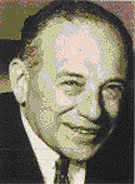 |
| Benjamin Graham |
| Born: | |
| Affiliations: |
|
| Most Famous For: | Ben Graham excelled as an investment manager and financial educator. He authored, among others, two investment classics of unparalleled importance. He is also universally recognized as the father of two fundamental investment disciplines – security analysis and value investing. His two seminal books, "Security Analysis" (1934), written with David Dodd, and "TheIntelligent Investor" (1949) are considered by many investment professionals to be the best books ever written for stock investors. Both of these books have never been out of print and are still used as texts for university-level courses on investing. John Train, in his investment classic, "The Money Masters" (1980), cites Graham\'s brilliance and influence as such: "Benjamin Graham ranks as this century\'s (and perhaps history\'s) most important thinker on applied portfolio investment, taking it from an art, based on impressions, inside information, flair, to a proto-science, an orderly discipline. He applied great astuteness, hard experience, and infinitely detailed labor to a field full of superstition, tips and guesswork, one in which most people who have something to say also have an incentive to deceive the listener." He is also famous for being a teacher and mentor for Warren Buffet as well as for other well-known investors. |
Personal Profile
Benjamin Graham came to the United States as a one-year-old immigrant from England Manhattan Brooklyn , New York
He graduated from Columbia University
In 1926, Graham formed an investment partnership with Jerome Newman and started lecturing at Columbia
Ben Graham learned some valuable lessons from this experience and, in 1934, co-authored a hefty textbook titled "Security Analysis", which is widely considered an investment classic. The Graham-Newman partnership prospered, boasting an average annual return of 17% until its termination in 1956.
Investment Style
Morningstar's online Interactive Classroom carries this anecdote about the results of Ben Graham's investing style:
"In 1984, [Warren ] Buffet returned to Columbia Columbia
It is difficult to encapsulate Benjamin Graham's investing style in a few sentences or paragraphs. Readers are strongly urged to refer to his "The Intelligent Investor" to obtain a more thorough understanding of his investment principles.
In brief, the essence of Graham's value investing is that any investment should be worth substantially more than an investor has to pay for it. He believed in thorough analysis, which we would call fundamental analysis. He sought out companies with strong balance sheets, or those with little debt, above-average profit margins, and ample cash flow.
He coined the phrase "margin of safety" to explain his common-sense formula that seeks out undervalued companies whose stock prices are temporarily down, but whose fundamentals, for the long run, are sound. The margin of safety on any investment is the difference between its purchase price and its intrinsic value. The larger this difference is (purchase price below intrinsic), the more attractive the investment - both from a safety and return perspective - becomes. The investment community commonly refers to these circumstances as low value multiple stocks (P/E, P/B, P/S).
Graham also believed that market valuations (stock prices) are often wrong. He used his famous "Mr. Market" parable to highlight a simple truth: stock prices will fluctuate substantially in value. His philosophy was that this feature of the market offers smart investors "an opportunity to buy wisely when prices fall sharply and to sell wisely when they advance a great deal."
Publications
- "Security Analysis" (1934) by Benjamin Graham and David Dodd
- "The Intelligent Investor" by Benjamin Graham (1949)
- "Benjamin Graham: The Memoirs Of The Dean Of Wall Street" by Benjamin Graham and Seymour Chatman (editor) (1996)
- "Benjamin Graham On Value Investing: Lessons From The Dean Of Wall Street" by Janet Lowe (1999)
Quotes
"To achieve satisfactory investment results is easier than most people realize; to achieve superior results is harder than it looks."
" Most of the time stocks are subject to irrational and excessive price fluctuations in both directions as the consequence of the ingrained tendency of most people to speculate or gamble … to give way to hope, fear and greed."
"Even the intelligent investor is likely to need considerable willpower to keep from following the crowd."
"It is absurd to think that the general public can ever make money out of market forecasts."
"It is rare that the founder of a discipline does not find his work eclipsed in rather short order by successors. But for over forty years after publication of the book ["Security Analysis"] that brought structure and logic to a disorderly and confused activity, it is difficult to think of possible candidates for even the runner-up position in the field of security analysis." (Warren Buffet, Financial Analyst Journal, November/December 1976)
No comments:
Post a Comment